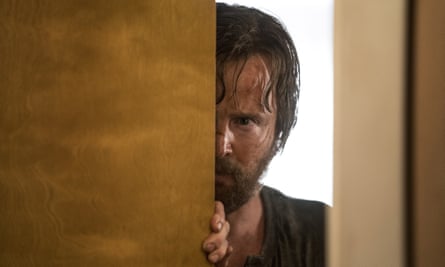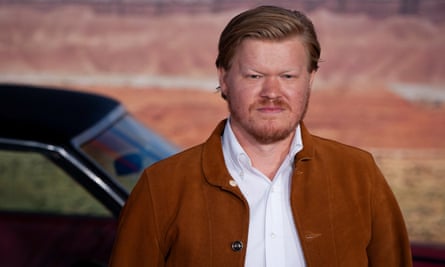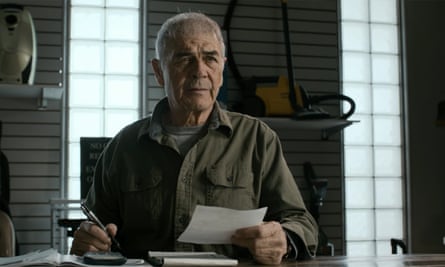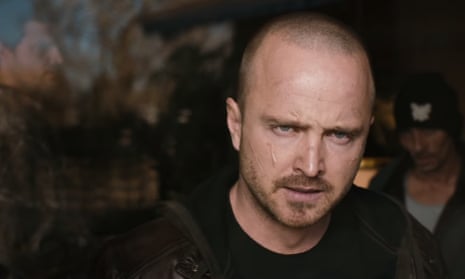The past weekend saw the much-anticipated release of El Camino: A Breaking Bad Movie on Netflix. As we knew from August’s press release and teaser, plus a couple of trailers and clips released since, the film would trace remorseful meth dealer Jesse Pinkman’s (Aaron Paul) flight from captivity and personal reckoning following the events of Breaking Bad’s 2013 finale.
Beyond that, we weren’t given much in the way of details, which led many to wonder exactly what shape the film would take, as well as what, if any, surprises it held for the show’s surviving characters, dangling plot threads and existing mythology.
When it dropped on Friday at midnight, diehard fans took to the film like it were a fresh batch of Blue, and now that everyone else has had time to catch up, we can delve into some of the film’s key moments and biggest talking points.
Sequel, spin-off or postscript?
Despite the title of the film – El Camino is a reference to Jesse’s getaway car, which also translates in English to “the way” – the film is neither a road film nor a chase movie. Nor, for that matter, is there much in the way of overarching plot: Jesse spends most of his time trying to flee Albuquerque, attempting to remain hidden in plain sight as he deals with a handful of unforeseen obstacles, as well as a severe case of PTSD.
This structure, combined with numerous lengthy flashbacks (all of which, it should be noted, are new scenes), makes El Camino feel less like a standalone film than three slightly truncated episodes of Breaking Bad stacked back-to-back. This isn’t necessarily negative – if these had been episodes of the series they’d rank among the very best – but it does give the film a slightly off-kilter rhythm.
Meanwhile, some Breaking Bad fans might be disappointed by El Camino’s relatively low-key stakes, at least compared to the epic scale of Breaking Bad’s latter seasons, though they are probably in the minority: all of the major set pieces retain the tight, intelligent plotting and nigh-unbearable tension we’ve come to expect from writer-director Vince Gilligan, while the unbroken focus on Jesse provides an emotional catharsis that greatly adds to the larger Breaking Bad canon.
But was it necessary?
While El Camino has received strong reviews, one talking point that keeps popping up is the notion that since it doesn’t throw any big twists our way, or even really expand on what we probably surmised at the end of the original series re Jesse’s fate, the film is somehow unnecessary.
Even without diving into a larger discussion about the necessity of any individual film, such criticism still reads as bogus: El Camino gives us the opportunity to re-enter a world we’ve come to love and to catch up with characters we’ve missed. While it’s far too intense a thriller to be considered a classic hangout movie, it nonetheless operates on a similar level.

That it succeeds at all without engaging in any annoying story retconning or cheap fan service (the closest it comes is allowing Jesse one utterance of “Bitch!”, although even that is entirely justified by the context) is a further testament to its quality. I predict the film’s esteem will only rise in coming years, once it’s further removed from preconceived notions and expectations that immediately preceded it.
Who’s back?
We knew from the trailers and teasers that a few recurring characters from Breaking Bad would be returning alongside Jesse – namely, his ne’er-do-well homeboys Badger (Matt L Jones) and Skinny Pete (Charles Baker), as well as fan favorite Old Joe (Larry Hankin), the wily salvage yard owner who’d helped Jesse and Walt out of several a tight spot in the past.
The irascible Badger and Old Joe make the most of their short time on screen, but it’s Skinny Pete who leaves the biggest impression, his unwavering loyalty to his friend, who he movingly calls his hero (and shit) transforming him into the heart of the film and garnering the biggest reaction on social media.
Beyond those three lovable scoundrels, it was an open question as to who else might make an appearance. Of the surviving characters, it seemed unlikely any of the extended White family would pop up, given they rarely, if ever, interacted with Jesse. Indeed, that turned out to be the case. The movie does, however, give Jesse the chance to say a proper goodbye to his own long-suffering parents (Tess Harper and Michael Bofshever) in a moving scene that mirrors Walt’s final goodbye to Skylar from the season finale. Rather than simply apologize, Jesse takes responsibility for his actions, thereby lessening the moral burden of his loved ones (though he also manipulates them one final time).
Aside from one other surviving character who plays a large part and a couple of brief cameos (a pair of government officials from Breaking Bad and Better Call Saul), the remainder of the reunions are given over to deceased characters by way of flashbacks.
Two such scenes serve as the film’s bookends: in the first, Jesse’s doomed mentor Mike Ehrmantraut (Jonathan Banks) gives him the idea to move to Alaska, while warning him that he’ll never be able to truly start fresh. In the second, his similarly doomed lover (and fellow Walt murder victim) Jane Margolis (Krysten Ritter) talks to him about the nature of the universe and the necessity of deciding one’s own path. Both scenes inform Jesse’s path forward and hint at a future where, even if he’s unlikely to find full redemption, he might be able to live without the ghosts of his past continually weighing him down.
Of all those ghosts, Walter White continues to loom the largest. In El Camino, his name is only mentioned a handful of times, always over news reports (which, by the way, 100% confirm his death, thereby shutting down any remaining fan theories that he somehow survived the events of the finale), although he does eventually appear in a flashback towards the end of the film.
Set shortly after their near demise in the middle of the desert during season two, Walt and Jesse commiserate over lunch at a motel buffet, Walt attempting to convince Jesse to use his cut from their big score to get an education, and telling him he’s lucky he didn’t have to wait until the end of his life to make something of himself. It’s one of the most somber scenes in the entirety of Breaking Bad, and a touching reminder that, for as much pain and suffering as he inflicted on his former student and business partner, he also truly did love him.
The Todd show

Much to my (and probably many others’) surprise, the deceased character we spend the most time with is Todd Alquist (Jesse Plemons), the cherub-faced, even-keeled psychopath responsible for so much of Jesse’s personal torment. The majority of the film’s middle section recounts a funny but disturbing misadventure that occurred during the months of Jesse’s captivity, where Todd brought him along to help dispose of the corpse of his cleaning lady, who he strangled to death after she stumbled upon his hidden stash of cash.
The casual nature with which Todd goes about the process of removing her cadaver from his cozy apartment – treating the whole thing as though they were moving a couch – displays Gilligan’s superb talent for writing pitch-black comedy of the noir-slapstick variety (the whole thing feels very Coen brothers-y in the best way, doesn’t it)? And just as in the latter seasons of Breaking Bad, Plemons steals the show by creating one of the most unnerving, yet oddly sympathetic monsters in modern pop culture.
I think we can all agree that should Gilligan wish to give us another Breaking Bad prequel in the near future, it should cover the heretofore unseen adventures of Todd. (Also, if I might indulge in a little bit of fantasy casting, Plemons proves here that he should play the lead in Yorgos Lanthimos’s upcoming adaptation of Jim Thompson’s hardboiled serial killer satire Pop. 1280.)
Kandy and co
One of Breaking Bad’s greatest strengths was the way it introduced its motley crew of villains, laying the ground work for their eventual confrontation with Walt/Jesse. Being that none of them ever came out the other side alive, Gilligan was tasked with introducing brand new villains in El Camino.
To that end, what did everyone think of Neil Kandy (Scott MacArthur), the conniving welder and petty crook with a past connection to Jesse, and his partner Casey (Scott Shepherd)? I thought they made for great antagonists in the Elmore Leonard tradition – just ruthless enough to pose a serious threat, but ultimately too shortsighted and small-minded to come out on top (MacArthur seems to be a natural playing this type, as evidenced by his similar turn on HBO’s The Righteous Gemstones).
I’ve seen some criticism that they felt lightweight, especially in contrast to the likes of Todd or Gustavo Fringe, but I think that’s kind of the point: they’re that final, stubborn obstacle standing in Jesse’s way. The fact he is able to dispatch them so easily (and cold-bloodedly) shows that, whether he wants to admit it or not, Walt truly was a great teacher, and Jesse a great student.
RIP Robert Forster

Finally, El Camino took on an unexpectedly melancholy dimension due to the death of actor Robert Forster the same day of its release. Best known for roles in Medium Cool, Jackie Brown (for which he received a much-deserved best supporting actor nomination) and Twin Peaks: The Return, Forster appeared in almost 200 movies throughout the course of his 50-plus-year career.
One of most memorable performances in recent times was that of Ed Galbraith, AKA “The Disappearer”, in the penultimate episode of Breaking Bad. Using a vacuum repair shop as a front, Ed operates as a kind of Charon for the criminal underworld, providing new identities and safe passage to those in need for the set price 125 large. The character was spoken of several times throughout the show (usually in hushed tones) before he made his one and only appearance, giving him a mythic quality that demanded an actor with the gravitas to match.
Few actors were as good at conveying gravitas as the granite-faced, steely-eyed Forster, and indeed, he left a major impression on the series despite his brief time on it. Many of us expected him to show up in El Camino, and needless to say, it was wonderful to have our expectations met.
Forster appears in two key scenes in El Camino, the first being among the funniest set pieces in all of Breaking Bad canon (Forster was an ace at deadpan comedy), and the second giving him the opportunity to deliver the film’s perfectly stoic, subtly moving denouement.
Sad as it is to have to say goodbye to the man, we should all take solace in the fact that he gave one final great performance in a high-profile film worthy of his talents. All actors should be so lucky.

Comments (…)
Sign in or create your Guardian account to join the discussion